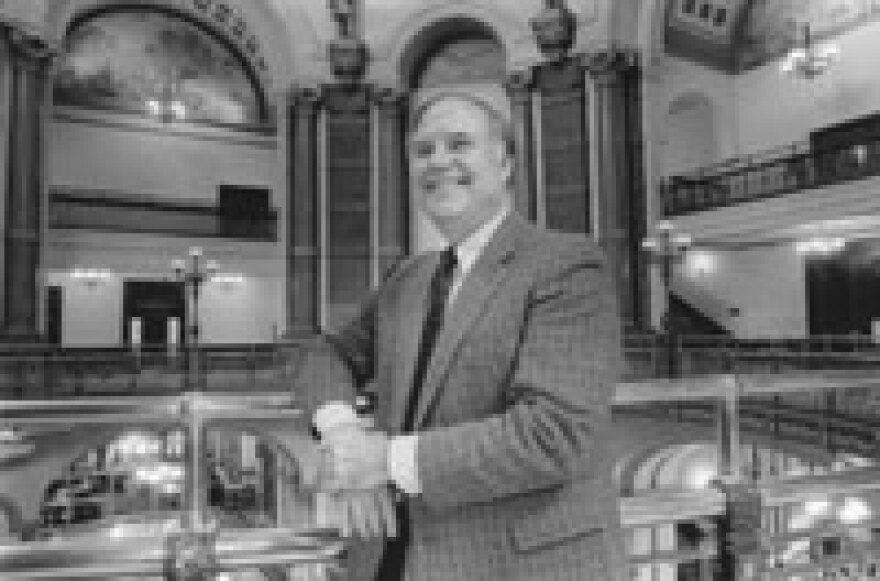For many years, Elvis Presley was a Las Vegas mainstay, drawing admiring legions to casino showrooms. His No. 1 fan in Illinois — Gov. Rod Blagojevich — may be no match for The King vocally, but the governor’s proposed budget for the fiscal year starting July 1 would do credit to another Strip headliner, magician David Copperfield.
“Illusion,” Copperfield says, “is the art of creating the impossible, making fantasy a reality.”
In the partial spending plan he unveiled a few weeks ago to the Illinois General Assembly, the governor seems to have accepted the challenge.
Ostensibly, the proposed FY 2005 operations budget — a capital plan is forthcoming later this month — closed what Blagojevich said was a looming $1.7 billion gap between anticipated resources and required spending, all without raising income or sales taxes or cutting vital state services.
How did the governor appear to achieve the impossible? To help make ends meet, Blagojevich called for almost $800 million in new revenue in FY05. Some $483 million would come from another round of tax and fee increases on the state’s business community, including $25 million in gaming taxes from a new Chicago-area casino. He also projected garnering some $200 million more from the federal government, chiefly in increased reimbursements for spending on hospital care and social services for the poor. In addition, he’s counting on $280 million in natural revenue growth, mostly in income and sales taxes, and $350 million from selling the 10th riverboat license.
On the spending side, Blagojevich wants to cut more than $1 billion, about three-quarters of it by consolidating some agencies and reorganizing others, operating state government more efficiently and reducing the state workforce, particularly administrators. He also proposed cutting funding levels for tourism promotion and for open land acquisition, and closing the Vandalia prison, the St. Charles youth center, and the Tinley Park Mental Health Center. In addition, he would trim the state’s pension contributions by some $268 million and pare $130 million from debt service, the dollars the state uses to repay past borrowing.
The new revenue, coupled with the spending cuts and internal reallocations, would close the pending shortfall, the governor asserted, and provide extra cash to boost education spending by $400 million, meet an estimated $690 million jump in Medicaid costs, direct $50 million to job training and bankroll more state troopers and parole agents.
Even after the governor’s 72-minute performance, though, wisps of fantasy still floated around his plan.
For starters, his proposed budget is not really balanced, at least not as the term has been used for decades. Traditionally, one compares the checkbook balance on June 30, the end of a fiscal year, with the bills still remaining to be paid. If the money in the bank is less than what needs to be paid, it’s a budgetary deficit. The governor projects an ending balance of $369 million on June 30, 2005, to cover $850 million in bills — a budgetary deficit of $481 million. Granted, that is a $23 million improvement over the $504 million deficit estimate for FY04, but it’s still a deficit.
Consider also some of the iffy aspects of his revenue plan:
• New taxes and fees on business. The Illinois business community was saddled with more than $700 million in higher taxes and fees last year to help shore up the FY04 budget. After the 2003 hit, the governor may have a harder time convincing lawmakers to take another bite out of business, especially in an election year.
• Increased federal reimbursements. Blagojevich hopes a newly enacted hospital assessment will pull down another $80 million in FY05, while switching to a fee-for-service payment format, instead of blanket contracts, for social service providers will earn the state another $60 million. But both need approval of federal officials who have become increasingly critical of creative state schemes to grab more federal dollars.
• Projected revenue growth of $280 million. Last fall, the administration pegged growth in the three largest general funds revenue sources — income, sales and utility taxes — at $458 million for the current fiscal year, and expected $20 million more from lottery sales and $213 million more from riverboat taxes. The governor’s proposed budget quietly reduced those estimates by $418 million. The moral? It’s easy to guess wrong when economic recovery passes you by.
More question marks surround his proposed spending cuts:
• Won’t local lawmakers block his proposed prison closings? Vandalia Correctional Center, for example, is on the home turf of Senate Republican Leader Frank Watson from Greenville, who has pledged to fight the closing.
• Can the governor short the state’s mandated contribution to the pension funds? Blagojevich aides argue that the state sold $10 billion in pension obligation bonds last year at a lower interest rate than expected, thus saving some $860 million in interest payments over the 30-year life of the bonds. They want to use a quarter of the projected savings to reduce this year’s contribution, a proposal that runs afoul of a state law requiring the state to kick in the full $2.4 billion.
• By restructuring payment terms for some state borrowing, Blagojevich will be able to save some $130 million in FY05 by paying only interest, and no principal, on the borrowing, a practice called backloading. Like a homeowner with a balloon mortgage, Blagojevich is trading smaller initial payments for a mountain of debt down the road for some future governor. Meanwhile, money that would have begun paying off the borrowing instead will go for day-to-day spending, similar to one’s paying for the groceries with a credit card.
Senate Republicans have decried the practice, to no avail. Perhaps they should ask the real David Copperfield to visit Springfield and make the debt disappear.
Charles N. Wheeler III is director of the Public Affairs Reporting program at the University of Illinois at Springfield.
Illinois Issues, March 2004






